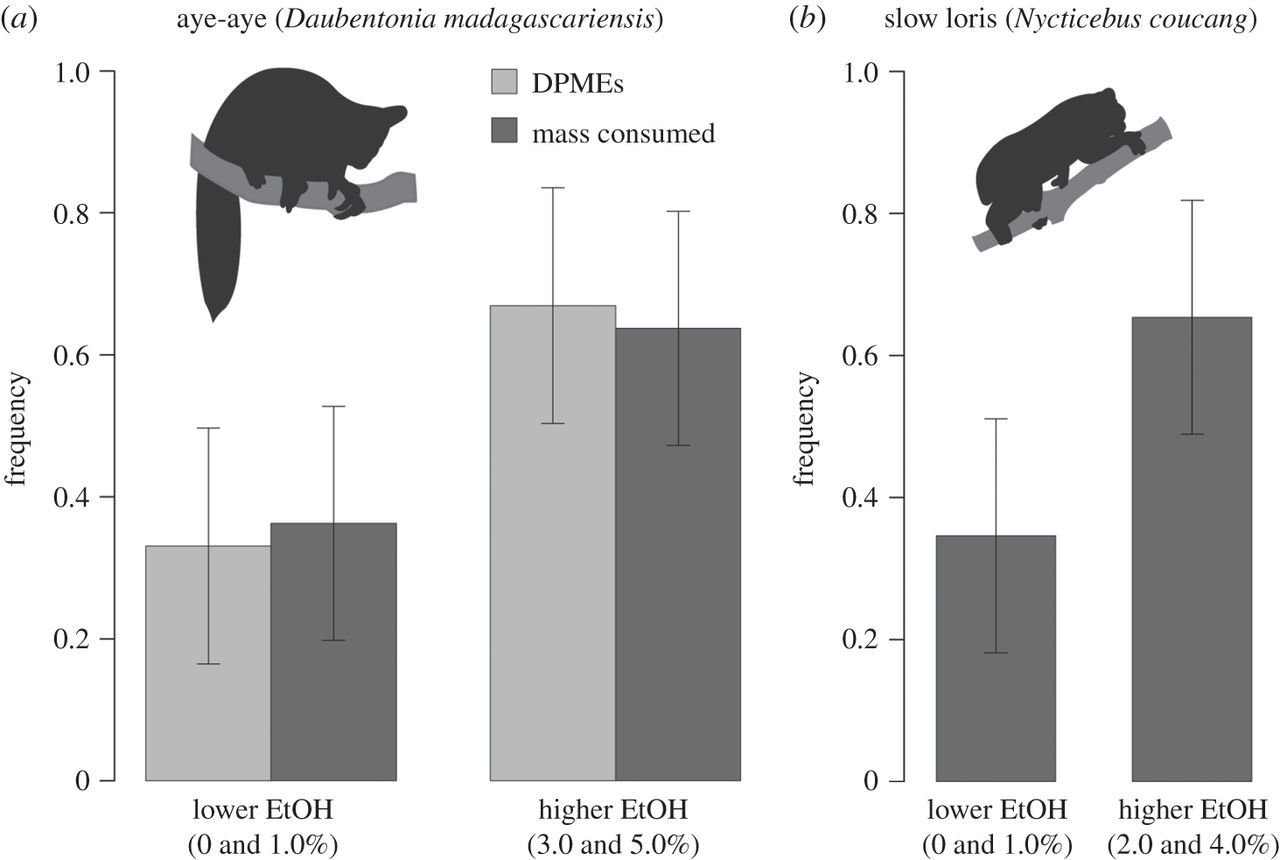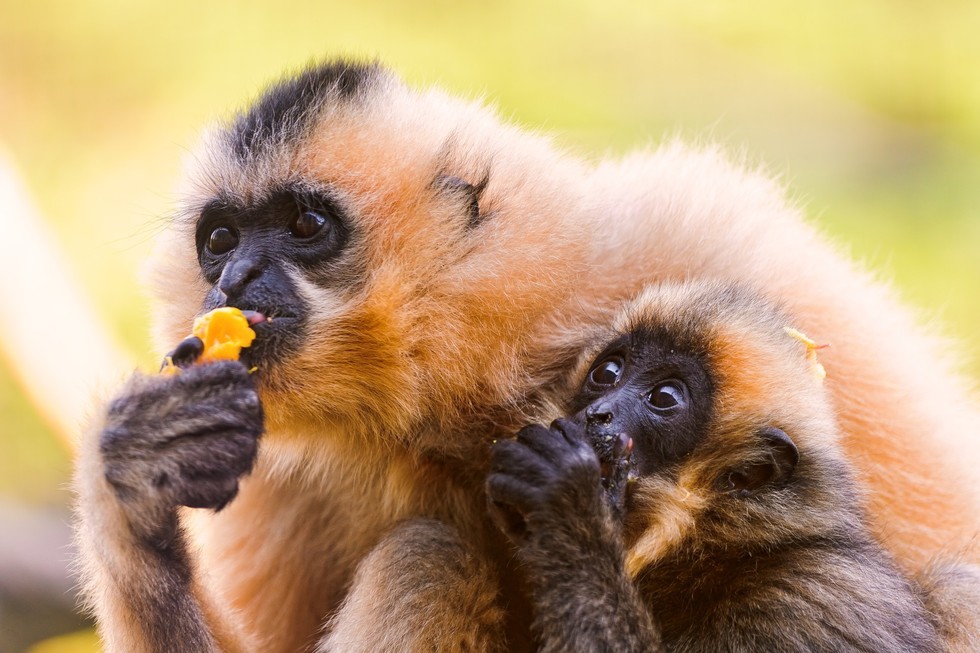Lower primates also prefer alcoholic beverages.

Madagascar Rookage (also known as ah-ay or aye-aye ), one of the primates capable of metabolizing alcohol in large quantities
Ethanol is widely distributed in nature as a product of fermentation and fermentation of honey, juice, fruit and other raw materials with sugar. Due to its high caloric content, it is a natural part of the diet of many primates. From this it follows, in turn, that primates evolved in such a way as to assimilate alcohol as efficiently as possible with a minimum number of negative side effects. Alcoholic beverages were part of the diet of hominids, human ancestors.
Back in 2014, scientists discovered that hominids and African primates have a specific genetic mutation that speeds up the absorption of alcohol by the body. [1]
In 2014, scientists investigated a class IV alcohol dehydrogenase (ADH4) enzyme, the first enzyme that interacts with ethanol in the digestive tract during its metabolism. Experts have studied the formation of the enzyme ADH4 in primates from 70 Ma. BC. It turned out that about 10 million years ago, the only A294V mutation in a single gene that encodes ADH4 occurred in the evolution of primates. As a result, our ancestors began to assimilate alcohol with much greater efficiency. Due to mutation, the catalytic efficiency of this process has increased 40 times.
The authors of scientific work note that this event roughly coincides with the way the hominids switched to a land-based lifestyle. They believe that the absorption of alcohol could be an evolutionary advantage for primates who live near the land, where fermented and fermented fruits are more likely. A better digestive tract allows you to consume more alcohol and, thus, get more calories.
But the most interesting thing is that this genetic mutation of ADH4 affected not only human ancestors, but also other primates. Now a group of scientists from Dartmouth College in New Hampshire found out that even some of the most primitive representatives of primates, so-called semi -monkeys , have a tendency to drink alcohol.[2]
One of the primates with a specific “alcoholic” mutation is the Madagascar fishing rod, shown in the photo above. Another primate found to consume alcoholic beverages is Slow Lori , one of the five species of Lori that inhabit tropical forests in eastern Bangladesh, Northeast India, Indochina and the islands of Western Indonesia. By the way, this is the only known species of poisonous primates in nature.
Slow lori is nocturnal, and during the day it usually sleeps in trees or lianas (one lori can have up to 60 favorite places to sleep). At night, slow Laurie goes in search of food, and moves forward very slowly and carefully,

Slow Lori
It was previously known that slow Lori consumes alcoholic beverages with a strength of up to 3.8% with an average median value of 0.6%. About the same diet was registered in Madagascar mitts. The latter takes alcohol in the composition of nectar equals . Until now, scientists did not know whether the monkeys specifically chose fermented fruits, or whether they were forced to endure the presence of alcohol against their will.
Madagascar mittens usually feed on the larvae, but they spend up to 20% of their time during the rainy season, sucking the nectar from the Ramals.
A group of scientists from Dartmouth College in New Hampshire conducted a study to test the food habits of two Madagascar mitts and one slow Lori. As a result of numerous tests, nectars with equal content of alcohol (0.0% and 1.0%) and higher alcohol content (3.0% and 5.0%) were offered to the experimental primates. Both primates showed a clear preference for drinks with a higher alcohol content: these nectars were consumed more often and in large quantities.

It was also found that Madagascar mittens not only prefer alcoholic beverages to ordinary juice and drink them twice as much in volume, but also repeatedly check the containers after they are empty. This indicates that a drink with a higher alcohol concentration is more appealing to animals and would like to refill the container.
“Obsessive sensing of residual traces of alcoholic beverages indicates a high attractiveness or craving,” write the authors of a scientific paper published in the journal Royal Society Open Science .
Characteristically, during the experiment, no animals received intoxication and showed no signs of impaired motor coordination or altered behavior. This is critical for primates, which are often nocturnal, moving through trees, which requires good coordination of movements. The experiment showed that alcohol consumption has evolutionary advantages, even taking into account the risk of intoxication.
Primatologists have long known that the apes constantly take alcohol. For example, gibbons and other primates get up to 95% of calories from fruits. It is quite natural to assume that with this amount of fruit they will come across fermented fruits every day, so that regular drinking of these gibbons can be quite significant.

Mother and cub gibbons for food. Photo: Tambako the Jaguar / Flickr
Now scientists have proven that not only great apes, but also lower primates prefer alcoholic beverages. “It is widely believed that alcohol is toxic and negatively affects the musculoskeletal system, survival and physical fitness,” says study lead author Samuel Gochman. “However, there are not enough calories in the environment, and alcohol is a rich source of calories for primates with a high metabolic rate. Thus, the nutritional benefits of consuming moderate amounts of alcohol may outweigh its disadvantages, especially among members of the species with an advanced digestive system that effectively decomposes alcohol, as in humans. ”
Scientists emphasize that they received permission to experiment from the Duke Center for Lemurs and the Duke University Institutional Animal Care Committee. The experiments were conducted in accordance with the principles of ethical attitude to the lowest primates of the American Society of Primatologists.
This experiment also indirectly confirms the evolutionary nature of alcoholism in humans. People’s craving for alcohol is probably a consequence of the ecological and dietary characteristics of the life of ancient hominids and, possibly, of all primates. For this reason, alcohol is the most popular psychoactive substance that modern people take. But scientists emphasize that the digestive system of our ancestors is not adapted to splitting beverages with an alcohol concentration of more than 5-6%.
At the same time, some scientists put forward the opinion that the use of this toxin in small quantities in a paradoxical way can be beneficial to health , since it keeps the immune system in working condition. And the immune system, in turn, is directly related to the work of the brain, including affecting a person’s social behavior .
[1] Hominids adapted to metabolize ethanol long before human-directed fermentation . Matthew A. Carrigan, Oleg Uryasev, Carole B. Fryeb, Blair L. Eckmanb, Candace R. Myersc, Thomas D. Hurleyc, Steven A. Bennerb. PNAS , January 13, 2015 vol. 112 no. 2 458-463. DOI: 10.1073 / pnas.1404167111. Return to article
[2] In two species of nectar-feeding primate . Samuel R. Gochman, Michael B. Brown, Nathaniel J. Dominy. Royal Society Open Science , July 20, 2016. DOI: 10.1098 / rsos.160217. Return to article
